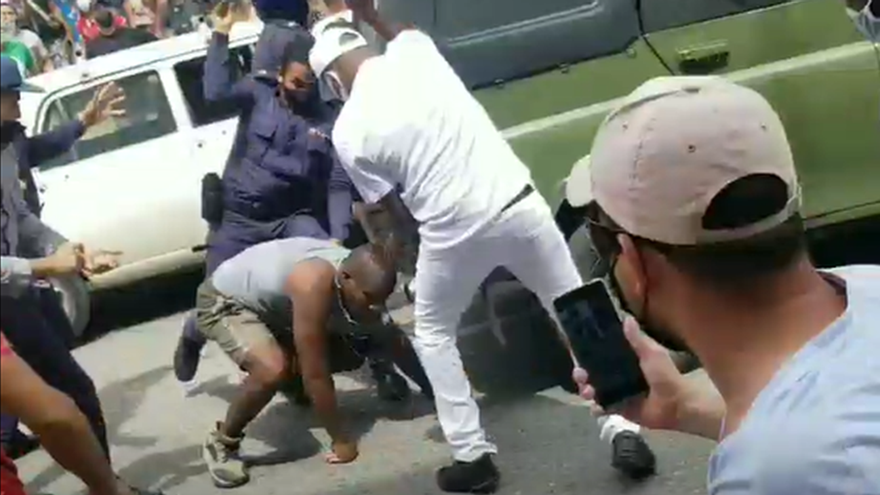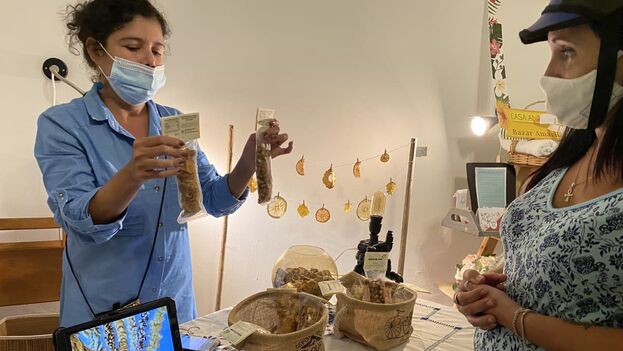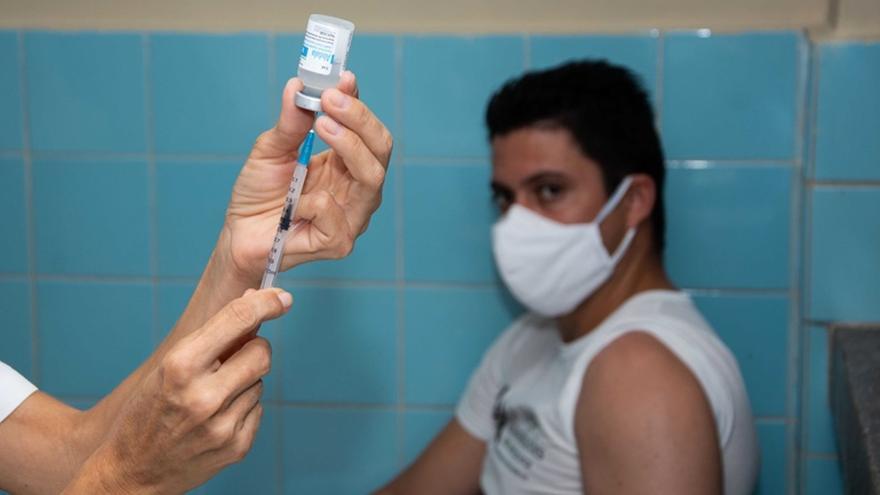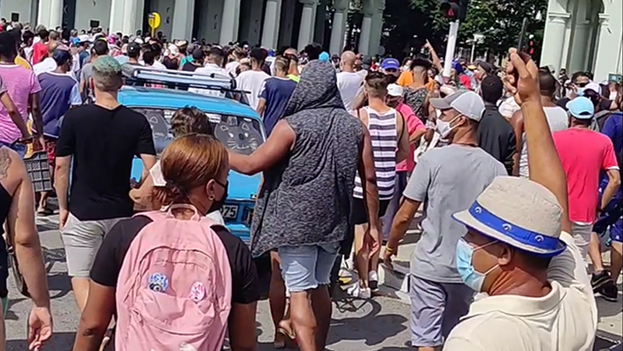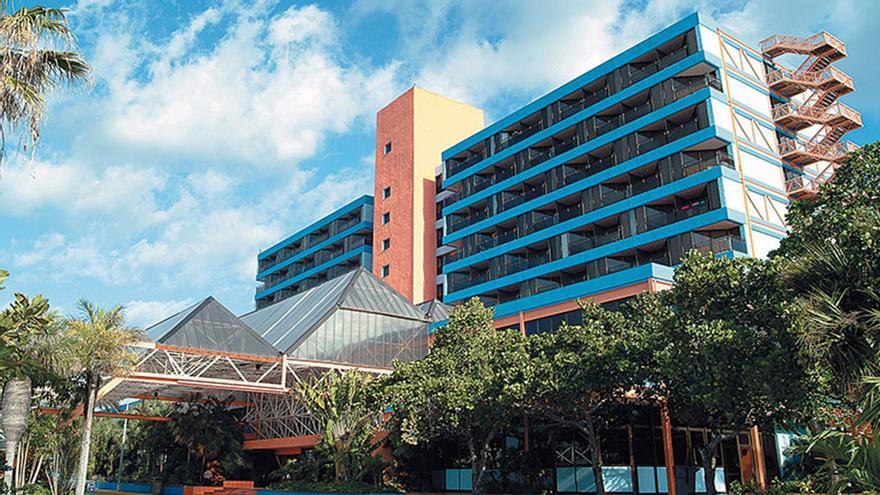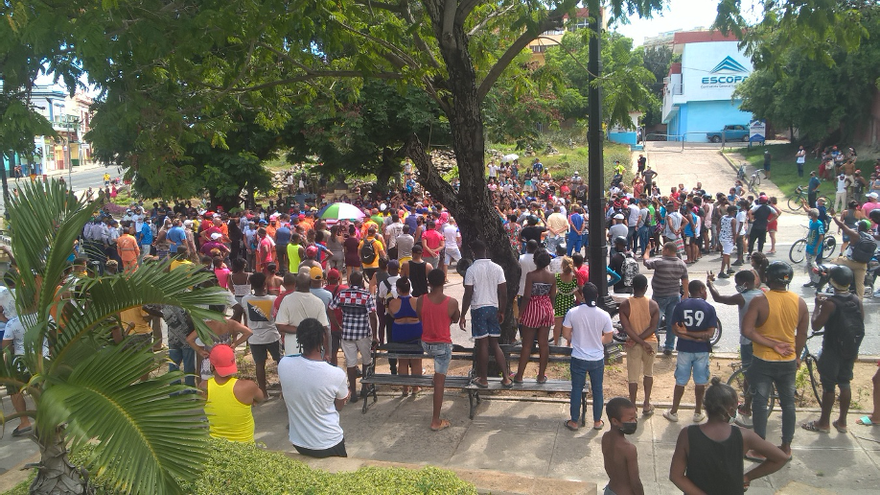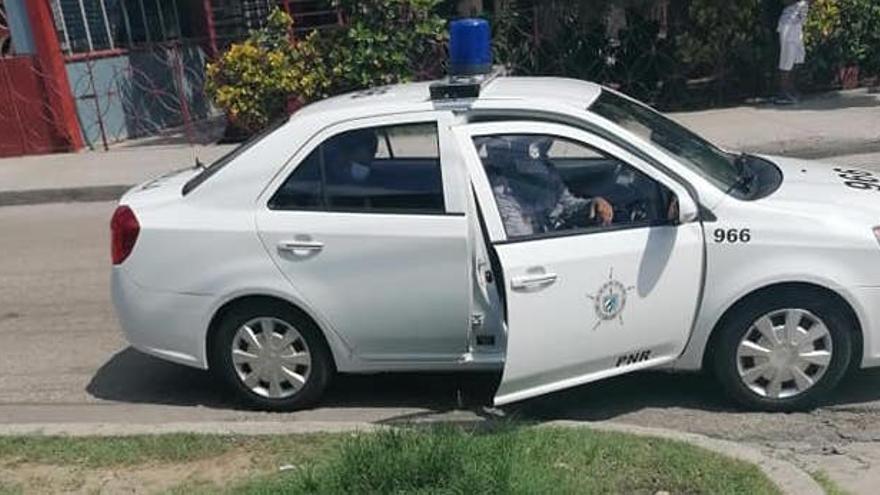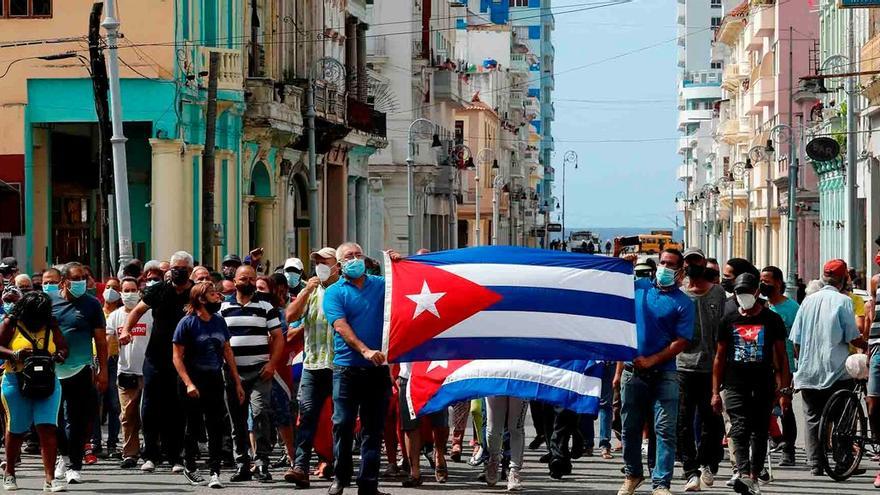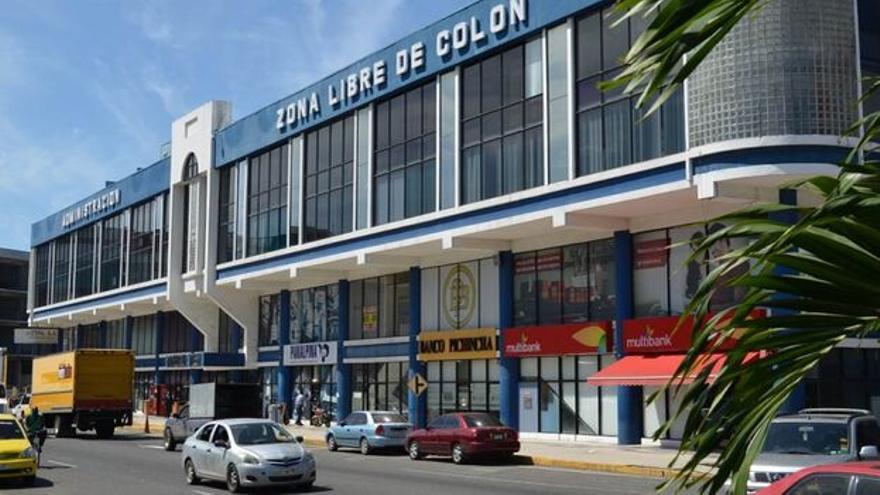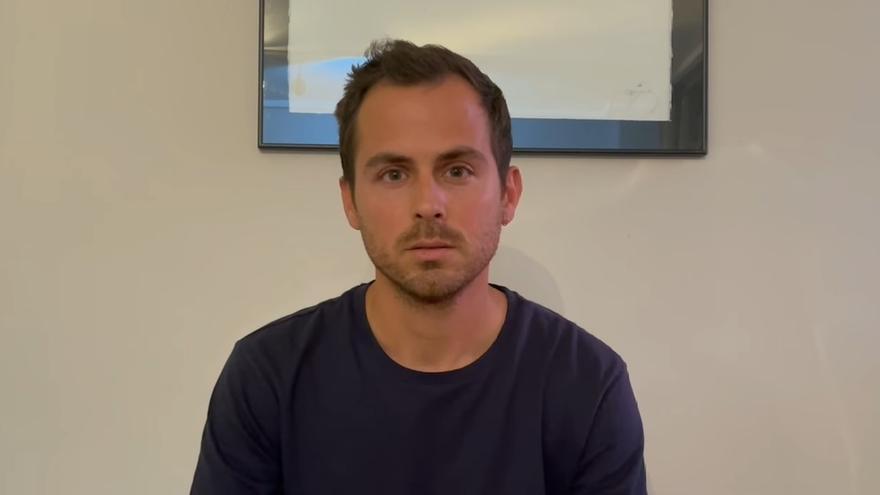Yesterday, this medium led the charge with Manuel Marrero, Cuba’s prime minister, and some speculation. In the end, it was the same as always. Buying time with superficial patches designed to appease social tension but which shortly will prove to be useless. On the other hand, the back and forth between the Cuban communist regime’s two power centers continues, and that tension is no longer hidden. At least, it was clear in the Roundtable, with a relaxed Marrero dressed in a black guayabera.
The prime minister began by talking about the blackouts, assuming that it is an issue that worries people and is a factor in the protests. Nevertheless, he came to say that the power plants of Lidio Ramón Pérez (Felton), Antonio Guitera, and Máximo Gómez were not in the process of production and required “synchronization.” This a major issue behind the rolling-blackouts.
In addition, the PM warned that the matter was not resolved, so the blackouts will continue as long as the origin is not resolved, and this origin is none other than the lack of funding. He set the goal of permanently having 500 megawatts of reserve. This would be the only way to cover one of the large plants if it failed. The issue is that currently there is a reserve of 133 megawatts.
According to Marrero, in order to achieve the 500 megawatts reserve, the entire process of repairing and starting up the currently paralyzed machines must be continued. Many wonder what prevents these tasks from being performed on a regular basis, or alternatively, what the workers of these state monopolies do. Marrero did not speak about that. continue reading
Conclusion: there will continue to be blackouts, they will arrive without warning, suddenly, when people least expect it, and they will continue to affect the population. There is no alternative. And he ended by blaming Covid-19 and the growing need from quarantine centers, which has required protecting hospital circuits. They have had to resort to generators (12,000), which pollute and are the only response the regime can produce to the electrical chaos.
However, Marrero concluded by saying that the national energy situation is moving towards stabilization, and once again he insisted on the need to “save as much as we can save,” an argument that exasperates people who do not know what else to do to save. The dependence on oil, from Venezuela, that does not arrive leads us to think that the situation will not improve and that the minister lied. We will see.
In regards to vaccinations, he announced that by the end of August, almost 60% of the population will be fully vaccinated, but the difficulty is in producing enough vaccines, a statement that collides with recent announcements about possible sales of the vaccines developed in Cuba — Abdala and Soberana — to countries like Iran.
BioCubaFarma had delivered 3.4 million doses to the Ministry of Public Health and in June another 4.8 million, so that by July 12, 7,618,028 doses have been applied. As a percentage, this volume is close to group immunity in Cuba, yet Covid-19 is increasingly out of control throughout the country. Someone must have thought that something strange might be happening, because if, as Marrero said, Cuba exceeds the world average for the percentage of people who have received at least one dose, something is wrong.
He continued by stating that the Abdala vaccine’s efficacy of 92.28% places it among the most effective in the world, but without citing research from the WHO or other authorized bodies. He spoke of pediatric trials, the complexities of Covid-19, the difficulty of producing vaccines, in short, he did not say anything that is not known, without acknowledging that in the battle against Covid-19 Cuba (the great healthcare power) has lost. And that also causes discontent in the population.
At this point, the program segued into demagoguery and populism. The first came out of the blue and was unexpected. The regime authorizes the importing of food, hygiene, and medicines through special means. Remember, in this regard, the stores that only take payment in hard (i.e. foreign) currencies (MLC) were also announced as temporary and have been in operation for almost two years.
The decision of the regimen is justified by the shortage of drugs in hospitals and pharmacies. In other words, Cubans who come from abroad will be able to bring medicines without limits, an activity that will generate business, because the national system is collapsed due to the shortage of foreign exchange. Although the Cuban national industry produces almost 80% of the official drugs, the most affected products are related to antihypertensives, antibiotics, analgesics, contraceptives, vitamins and products for dental use.
At this point in the program, the United States embargo appeared, as it was responsible for the fact that suppliers, due to pressure and new US government measures, were unable to guarantee shipments. Marrero did not mention that Cuba’s trade with the United States currently includes more than 50 million dollars of medical imports.
He highlighted the measure, which is due to the priority of the production of medicines to combat covid-19 and the hospital network, for hemodialysis, hypertensive, antibiotics, diabetics and oncology patients, as well as for quarantine centers and the network of pharmacies. There is no doubt that more than one Cuban will be vaccinated with vaccines from abroad, which are more reliable.
In addition to medicines, food and hygiene items may be brought from abroad to natural persons, a decision that will relaunch the ’mule’ business, at levels similar to those before the MLC stores began operating. In fact, limitations on the quantities per type of article allowed are no longer in force, allowing for the free importation of these goods and also, as a gift, free of customs duties.
In essence, exceptionally and temporarily, immediately (Monday, July 19) the communist regime of Cuba authorizes passengers with accompanying luggage to import of food, personal hygiene and cleaning products, and medicines without limit and free of payment of tariffs until December 31, 2021. The limits will be set by the airline. It is a shame that the regime recognizes that it cannot feed the population or meet their demands for hygiene and medicine, and throws in the towel. The loss in foreign exchange that is will experience for this decision is in the millions.
Marrero then referred to the new measures for the distribution of regulated food. So complex is the communist bureaucracy that the case of people who have settled in other provinces, even without legal address, and who do not have a ration book in the place where they reside, have to be evaluated. It is intended to update this regulation that what should be done is to delete it.
Some 30,000 people are in this situation, mostly in the capital, although it also occurs in other territories. They also talked about the measures in the agriculture sector that, according to Marrero, have allowed an increase planting plans and have created the basis for moving forward, but he did not offer a single piece of information. And about the monetary system, he limited himself to saying that “decisions continue to be made regarding issues that arose during the implementation.” And a little more.
Another populist measure announced at the Round Table is the elimination of the obligation to use the salary scale for the payment of wages. It was the economy minister who took the floor to explain this matter.
He pointed out, by way of introduction, that on May 26, in a session of the Council of Ministers, the process of improvement of economic actors was approved, which includes the non-state sector and the state sector, with the state company as the main subject of the economic model.
And he cited the two measures approved for implementation in the state company. On the one hand he presented an update on the status of the process of elaboration of the legal norms on micro, small and medium enterprises, self-employment and non-agricultural cooperatives and, on the other hand, with reference to the agreements of the 8th Communist Party Congress, pointed out that the improvement of the remuneration system for the work contributed, that is, how the salary is set in the socialist state enterprise, was one of the priorities set.
The first steps have been taken in modification of the payment systems and the incorporation of the distribution of the profit as mobile income of the workers and the government has agreed to eliminate the obligation to use the salary scale for the payment of salaries in state-owned companies.
As the minister said, it is “a measure of great depth and depth, which gives autonomy to the direction of the state company and a great deal of responsibility. The payment of salary by a scale that, in practical terms, is already approved by the Ministry of Labor and Social Security, which is not the same as having an approved salary fund and having the autonomy to distribute that fund in correspondence with the different positions, activities, professions of the staff in the company.” Of course not. The decision can lead to a spiral of wage increases without a productivity counterpart that ends up resulting in a lack of profitability of the companies, which forces them to come up with more subsidies from the budget.
For this measure to have an impact on the business sector, no matter how gradually it is imposed, productivity and competitiveness devices fail, which depend on market demand and technology. It is like building a house starting with the roof. Playing with salary scales and breaking the principles of “Cuban collective bargaining” without reforming the basic principles of the economic system can be a disaster for the field of labor relations.
The minister recognized this when he said that companies have to “have accounting, organization, development in human resources management, adequate internal control, which allows us to test and generalize this measure to the rest of the economy until it reaches all the state companies.” Ah, what don’t they have?
It is fine to increase the salary of workers, but productivity is essential and if companies are not free to configure their productive structure, this measure is not going anywhere. The minister knows that if he wants to respect the principle that the more that is earned the more wealth is generated, the more efficient it is and the more it contributes to the State, there is no alternative but to privatize the business system, and establish a respectable framework of proprietary rights. There is no other way.
It is not a question of giving the non-state sector “certain freedom to set the amount of money paid to workers, which we are incorporating into the operation and management of the socialist state enterprise.” It is about liberalizing the technical and organizational elements linked to the productive structure so that companies can make decisions freely, both state and non-state.
Next, the Minister of Economy made reference to the new measures regarding the ways of functioning and operating of the micro, small and medium state enterprise, as part of the strengthening of the socialist state enterprise itself, which is owned by the state, assuming it must have a role distinct from that in a private company. The question is immediate, why should it be this way? There is no reason why the management of a company, state or non-state, is different. Both must respond to their boards of directors in terms of profitability, producing goods and services with demand in the market and at good prices.
Although the minister does not believe it, the budgeted units, companies and Higher Organizations of Business Management, and also scientific centers and universities, must act as described. The issue of mirco, small and medium-sized businesses (MSMEs) is being circled a lot and there is the feeling that the communist government does not want them to be free of, but rather subject to, political control. Bad business. Free enterprise does not believe in subordination of any kind or in political hierarchies or obedience. It only responds to the board of directors and its clients and stakeholders. The owner is the owner, and must be responsible for his company to workers and customers. Any patching is inefficient and will not make MSMEs work.
____________
COLLABORATE WITH OUR WORK: The 14ymedio team is committed to practicing serious journalism that reflects Cuba’s reality in all its depth. Thank you for joining us on this long journey. We invite you to continue supporting us by becoming a member of 14ymedio now. Together we can continue transforming journalism in Cuba.

![]() 14ymedio, Havana, July 16, 2021 – The poet Javier L. Mora (b. Bayamo, 1983) was arrested this Friday in Holguín after denouncing the repression against protesters in recent days, several of his colleagues confirmed to 14ymedio. The arrest of the writer occurred at his home hours after he made public his resignation from the Union of Writers and Artists of Cuba (Uneac) on social media.
14ymedio, Havana, July 16, 2021 – The poet Javier L. Mora (b. Bayamo, 1983) was arrested this Friday in Holguín after denouncing the repression against protesters in recent days, several of his colleagues confirmed to 14ymedio. The arrest of the writer occurred at his home hours after he made public his resignation from the Union of Writers and Artists of Cuba (Uneac) on social media.
